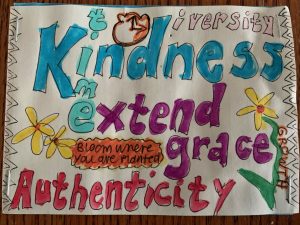
10 Questions with Victoria Grant
June 14, 2022
The scary ‘C word’ in high schools
June 14, 2022These steps can equip clients with the language, knowledge and insights to align their career path with what matters to them
Helena Prins

While my artifact (shown right) in response to the activity was very simple, this hands-on, creative exercise was a powerful personal experience, as well as an excellent team-building activity. Finding similarities between myself and my co-workers felt affirming, while differences made for curious conversations.

Courtesy of author
And the certified career strategist inside of me was doing a happy dance! I firmly believe that those who have a positive alignment between their values and their job have a higher level of job satisfaction and success. The opposite is also true: if there is a misalignment between your values and chosen career path, it will lead to a disconnect. The “Great Careers Disconnect” could manifest itself as apathy, resentment, burnout or poor performance. Knowing and understanding your own values, or supporting your client in knowing theirs, is one way to strengthen career connectedness.
What are values
There are a few different ways to think about values.
Simon Sinek’s take on values resonates deeply with me – he states that values have to be verbs. Sinek proposes that “values are the things you do, the things you live by … and you can’t do nouns.”
“If there is a misalignment between your values and chosen career path, it will lead to a disconnect.”
Another of my favourite definitions of values comes from Brené Brown’s book Dare to Lead: “A value is a way of being or believing that we hold most important. Living into our values means that we do more than profess our values, we practice them.”
For the purposes of this article, I define values as the principles we choose to live by.
Why is knowing values important in career development?
Values build resilience
Research has shown that connecting to personal values can help people be more resilient in the face of stress. According to Patterson and Kelleher (Resilient School Leaders. 2005, p. 51), the process of “privately clarifying, publicly articulating, and consciously acting on” core values is a great source of strength in helping people face adversity and emerge stronger than before.
Values have motivating powers
Sinek wrote a bestseller just over a decade ago that underlines the motivational power of knowing your “why.” According to his framework, your “why” makes clear your purpose – why we do what we do. Guiding your client to the answer of why they do what they do will not only help them to truly differentiate their value proposition, but it will also provide a reason to keep going, especially when life events make it hard or impossible to live in line with personal values.
Values give clues about an employer or potential employer
Could there be some tension between what your client values and what their company values? Or is there alignment? When your client is searching for companies to work for, ask them to look at what the companies list on their website as important values.
For example, if your client is considering a career in the banking industry, comparing the websites of the different financial institutions makes it evident which banks truly value diversity and which don’t. Their values are represented in the programs and projects they support. If your client is feeling resentful about their current employer, it could be helpful to explore a misalignment in values.
Read more
Navigating a world without resumes
Client Side: Finding my way home – when your career leads the way
The thing we never talk about in career development
Values come up during interviews
It is not uncommon for an employer to ask a question about an applicant’s values. In some cases, the question can be as direct as, “What are your top three values and how do they show up at work?” or “How do your core values align with that of our company?” It could also be examined more indirectly through behavioural or situational questions.
As career practitioners, we may have to help our clients understand that knowing their values will have a positive impact on their career development. Their behaviours reflect their values and how they choose to live each day. It is also important for your client to recognize that they can’t live values that they can’t name.
Here are several steps to equip clients with the language, knowledge and insights to align their career path in a direction that will allow them to fully live their values and to avoid a disconnect with their career development:
Step 1: Explore resources
- There are many free online self-assessments, like the Barret Value Centre’s “Personal Values Assessment,” that only take a few minutes and will provide your client with a report that could be used for a follow-up conversation.
- Nishnaabeg author Leanne Simpson articulates seven values in her 2011 book, Dancing on Our Turtle’s Back: Stories of Nishnaabeg Re-Creation, Resurgence and a New Emergence (pp. 124–127). Kokum Dibaajimowinan, the grandmothers’ teachings around courage, truth, respect, love, honesty, wisdom and humility, are common values typically reflected in Indigenous teachings.
- Provide your client with the list of the United Nations’ Sustainable Development Goals as a framework to help them expand their current career aspirations. Candy Ho suggests questions such as, “Which of the SDGs do you think you can contribute to as you work in your chosen field, and how so?” This can help your client better connect their work aspiration to a bigger purpose.
Step 2: Encourage reflection
Ask your client to consider their top 3 values and discuss:
- How has this value guided your career decision making?
- How does this value align with the values of your current workplace or role?
- If there is tension between your values and those of your workplace, what could you do next?
Step 3: Get practical
Once your client is more familiar with their values, you can support them to take practical steps to incorporate them into their career documents and planning. Consider:
- How do your client’s values show up in their resume, cover letter or online profile? Provide support to your client to tweak and update their professional application package.
- Who are the people in their network who embody these values? Encourage mentorship.
Ultimately, your clients will be happier when their value system aligns with their job (Forbes, 2020). It is also worth highlighting values might change over a lifetime. A young graduate might prioritize a job that will pay off student loans, while autonomy and creativity might be more important to someone in a later stage of their career. Ideally though, your client knows their values, because there is no stronger antidote to the “Great Careers Disconnect” than living our values.
Helena Prins (she/her) is a Certified Career Strategist with Career Professionals of Canada and is currently an advisor in Learning and Teaching with BCcampus.

